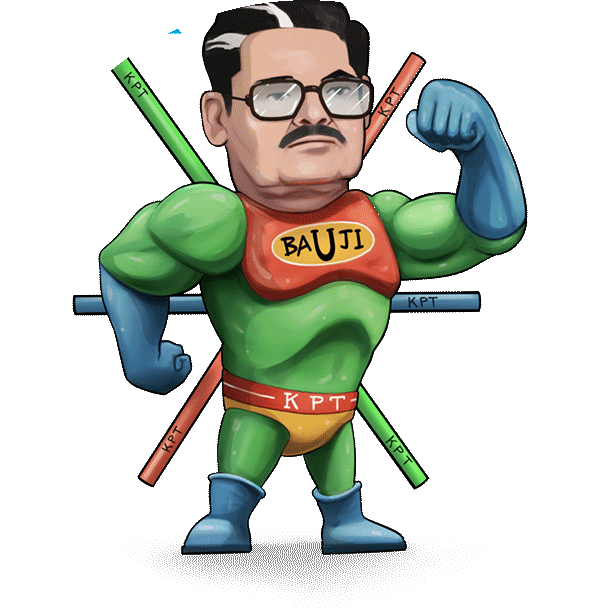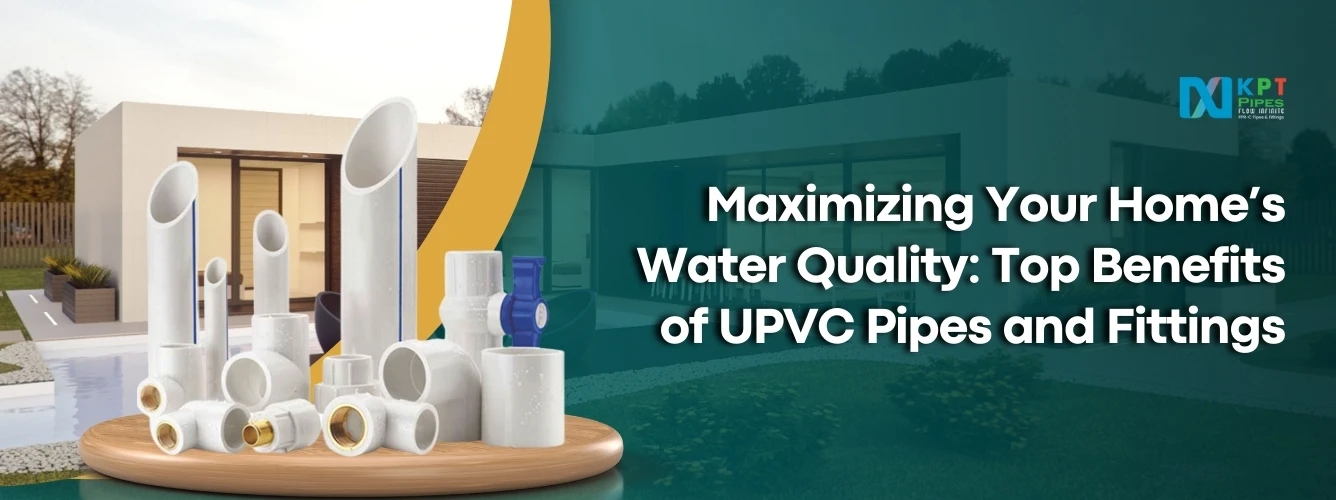Choosing the right pipes for your home’s water supply is more than just a technical decision. It lays a key foundation that strengthens or weakens the health and comfort within a home. Hence, you must never settle for anything like than an excellent pipe and fitting for your home. But are UPVC pipes and fittings among those excellent pipes?
Clean water fuels our daily lives, supports public health, and strengthens local economies. Yet river and groundwater sources often contain harmful contaminants such as viruses, bacteria, pesticides, and heavy metals. These contaminants must be removed from the water at treatment facilities. Once treated, water travels through miles of underground and in‑home piping before it reaches your tap. But can the quality of water be impacted based on the type of pipes and fittings at your home?
Yes, if the piping system is substandard, treated water can pick up contaminants. It may also lose pressure, both collectively leading to inconsistent flow and potential health risks. A reliable network of UPVC pipes and fittings however ensures smooth, safe delivery of potable water. But are they really worth the investment? Yes, their rising demand reflects the trust homeowners place in them for leak‑proof performance and long‑term durability. More and more people today are choosing UPVC water pipes and fittings. These piping systems are known to minimize future repairs, maintain steady water flow, and secure their plumbing system for years to come. Still not convinced? This article talks about some compelling benefits that showcases how and why these UPVC home piping systems are become the go-to choice for many.
Table of Contents
ToggleWhat Are UPVC Pipes and Fittings?
UPVC, or Unplasticized Polyvinyl Chloride, is a rigid plastic known for its strength and chemical resistance. UPVC pipes and fittings are made from high‑grade PVC resin without added plasticizers. This feature of these piping systems give them superior rigidity compared to standard PVC plumbing pipes. Their special composition also makes them highly resistant to corrosion, scaling, and chemical attack.
Key properties of these home piping systems include:
- High Tensile Strength: UPVC water piping withstand internal water pressures up to 16 bar without deforming.
- Low Thermal Conductivity: These piping systems minimize the heat loss in hot-water lines, in turn improving energy efficiency.
- Smooth Inner Walls: UPVC piping have a friction‑free surface that prevents scale buildup and promotes consistent flow.
- UV Resistance: Various UPVC pipes and fittings come is special UV‑stabilized grades. These pipes can tolerate sunlight when used in exposed networks.
Benefits of Using UPVC Pipes for Potable Water
1. Unmatched Corrosion Resistance
Traditional metal pipes often corrode from chlorinated or acidic water, releasing rust into your drinking supply. UPVC water pipes and fittings, by contrast, are inherently corrosion‑resistant. Their unplasticized PVC composition does not react with chlorinated water or common disinfectants. They retain full wall thickness and structural integrity even over decades. Moreover, their composition ensures no metal ions leach into your potable water. This purity protects your family’s health and eliminates costly corrosion‑related maintenance.
Opting for UPVC Pipes and Fittings means you are investing in a contamination‑free plumbing network that delivers crystal‑clear water, batch after batch. They do all this while eliminating the risk of microbial growth or rust buildup, which is often a characteristic of corroded metal pipes.
2. Exceptional Chemical Resistance
Household water often contains traces of cleaning agents, industrial runoff, or dissolved minerals. CPVC pipes and fittings may struggle with such of these solvents, but UPVC Pipes and Fittings repel most acids, alkalis, and organic chemicals. Their chemically inert surface avoids pitting or etching, unlike some older plumbing materials. UPVC piping maintains its integrity whether your water carries softeners, disinfectants, or low‑level industrial residues.
This resistance preserves joint seals and fitting connections, eliminating leaks and ensuring consistent potable water quality. Concerns about chemical‑induced failures become a thing of the past with UPVC at the core of your network. Choose them if you want to save on both repair bills and worry.
3. Long‑Term Durability and Low Maintenance
Every homeowner dreads the day a pipe leak forces a tear‑out of walls or floors. However, UPVC Pipes and Fittings ensure you don’t have to encounter that day for decades from now. These piping systems are manufactured from virgin‑grade resin. Hence, they provide decades of trouble‑free service. UPVC are known to retain mechanical strength even at high temperatures up to 60 °C in continuous service. That may not be the case for PVC plumbing pipes as these can soften under heat or brittle under UV, high‑quality. This gives UPVC Pipes an edge over the PVC piping. Also, UPVC fittings have the capacity to withstand stress cracking.
This means there will be fewer breakages and tighter joints over time. As a result, routine maintenance drops dramatically, freeing you from frequent inspections and emergency repairs. The initial investment in UPVC water pipes and fittings pays for itself through reduced labour and materials costs. Moreover, homeowners also enjoy a peace of mind that comes from a steadfast, low‑maintenance system.
4. Superior Flow Efficiency
Smooth pipe walls are critical for maintaining optimal flow rates. Pipes made of cast iron and galvanized steel often struggle with this due to lack of smooth inner walls. However, UPVC Pipes and Fittings feature interiors that are molded precisely into smooth interiors. Their smoother interiors can eliminate friction loss, ensuring water moves rapidly from source to tap. Reduced turbulence further keeps pump energy consumption low and preserves the design flow in complex plumbing loops.
Compared to older, rough‑walled materials, UPVC also delivers a more consistent travel speed and flow. This feature is especially beneficial in tall buildings, where pressure loss can lead to weak upper‑floor flows. This hydraulic efficiency translates into smaller pumps, lower power bills, and less noise. Optimizing flow with UPVC not only safeguards performance but also supports sustainable, cost‑effective plumbing infrastructure.
5. Lightweight and Easy Installation
Heavy metal or concrete pipes require cranes, multiple laborers, and complex fittings. UPVC water pipes and fittings on the other hand weigh a fraction of those materials. This makes their transport and handling simple, even for small crews. These pipes often feature socket‑weld or push‑fit joints that bond in minutes with standard solvents. Moreover, the bonding process does not require any special or expensive tools. Installation time of these piping system shrinks by up to 40%, reducing project timelines and labor costs.
The high flexibility and lightweight design of these home piping systems make installation on crawl spaces easier. Moreover, they enable a more hassle-free upgrade without needing any extensive structural support. Even vertical risers can be assembled on ladders by two plumbers. Choose UPVC Pipes and Fittings if you wish to streamline installation, accelerate project delivery, and want to avoid the cumbersome logistics of heavy piping alternatives.
6. Excellent Thermal Stability
You do not simply use a standard temperature of water at your home. Instead, water temperatures fluctuate daily between cold and hot cycles. This means your pipes must be able to handle these fluctuations. Even so, not all pipes are designed to work with both hot and cold water. However, UPVC Pipes and Fittings maintain dimensional stability under these shifts without warping or joint stress.
These home piping systems have low thermal conductivity. This results in less heat loss in hot-water lines, boosting energy efficiency. Unlike CPVC pipes that expand significantly under heat, UPVC pipes expands predictably within tight parameters, preventing leaks at joints. This reliability is critical in solar water heating or boiler feed systems, where precise temperature control is essential. By choosing UPVC, homeowners benefit from a plumbing network that withstands thermal cycling with minimal dimensional change. Choosing them means you choose to guard your plumbing system against cracks and secure seal integrity for years.
7. Hygienic and Safe for Drinking Water
Are you a really health-conscious homeowner? Health-conscious households commonly seek piping materials that are specifically certified for potable water. UPVC Pipes and Fittings meet stringent food‑grade standards. These home piping systems are also free of BPA, heavy metals, and phthalates. Their non‑porous interiors further resist bacterial colonization, preventing biofilm formation and microbial growth. Combined with airtight solvent‑weld joints, this hygienic design delivers pure, fresh water at every tap. Unlike some plastics that degrade and leach compounds over time, UPVC fittings also maintains its chemical inertness, ensuring that what flows through your pipes remains pristine. This means safer drinking, cooking, and bathing water for everyone in your family.
8. Cost‑Effective Lifecycle
UPVC water pipes and fittings may carry a slightly higher upfront price than basic PVC. However, their total cost of ownership is far lower and more beneficial in the long-term. Choosing UPVC Pipes and Fittings means minimizing the need of frequent part replacements, costly leak repairs, and energy losses due to inefficient flow or heat transfer. These home piping systems often have a long warranty periods of 25 years. Such warranties reflect confidence in UPVC’s longevity. Moreover, UPVC emerges as the most economical choice when you factor in reduced labour, fewer emergency call‑outs, and lower utility bills. This means property owners enjoy predictable maintenance budgets and better returns on their plumbing investment. In essence, UPVC eliminates hidden costs that typically plague cheaper pipe alternatives.
9. Eco‑Friendly and Recyclable
Sustainability matters in modern construction, and UPVC Pipes and Fittings are here to deliver it. UPVC Fittings are fully recyclable at end of life, reducing landfill waste. For instance, PVC plumbing pipes that require plasticizers or metals. This mandates intensive mining, impacting the environment negatively. Manufacturing of UPVC’s pipes on the contrary have a lower footprint. Its durability also means fewer replacements, cutting down on production‑energy consumption over decades. Choosing UPVC piping means supporting circular economies and minimizing environmental impact without compromising on performance. Hence, UPVC water pipes and fittings offer a clear path to greener, more responsible plumbing solutions for eco‑aware homeowners and builders.
Conclusion
Over the years, field performance data has shown that UPVC Pipes and Fittings outperform many conventional alternatives, not just in durability, but also in maintaining the biological safety of water. This is particularly crucial in regions where water stagnation, fluctuating pH levels, or residual chlorine can quickly degrade lower-grade piping.
Moreover, unlike certain metal pipes that can lead to metallic taste or discolouration in water over time, UPVC ensures taste neutrality. This means your water tastes just as it should. Moreover, their lightweight design enables safer vertical plumbing without requiring heavy-duty structural supports in high-rise constructions and gravity-fed systems. Homeowners get to experience many more benefits, like cost predictability with UPVC Pipes. So, why not make the intelligent choice for your household and install UPVC pipelines and fittings today?
Contact KPT Piping System Private Limited today. We combine technology, quality assurance, and customer trust to deliver UPVC solutions tailored for Indian conditions. Choose KPT to ensure your home’s water infrastructure is clean, safe, and future-ready.


